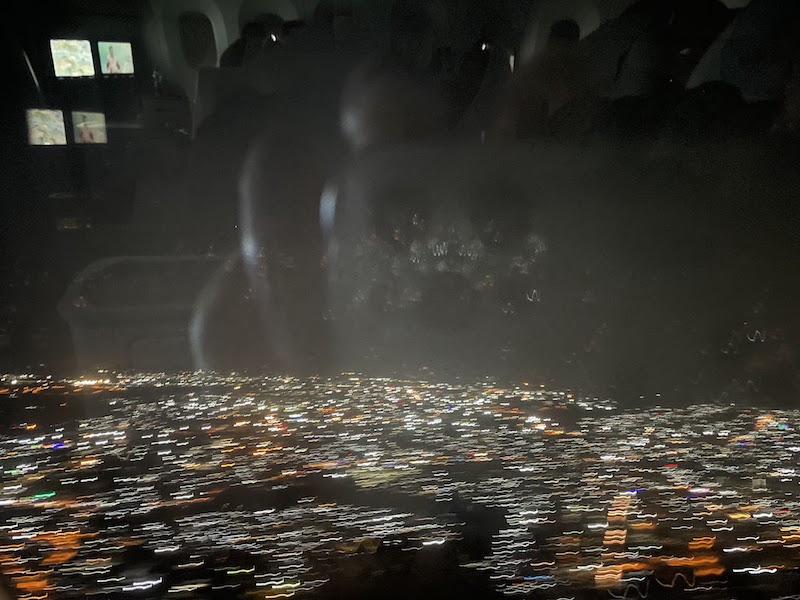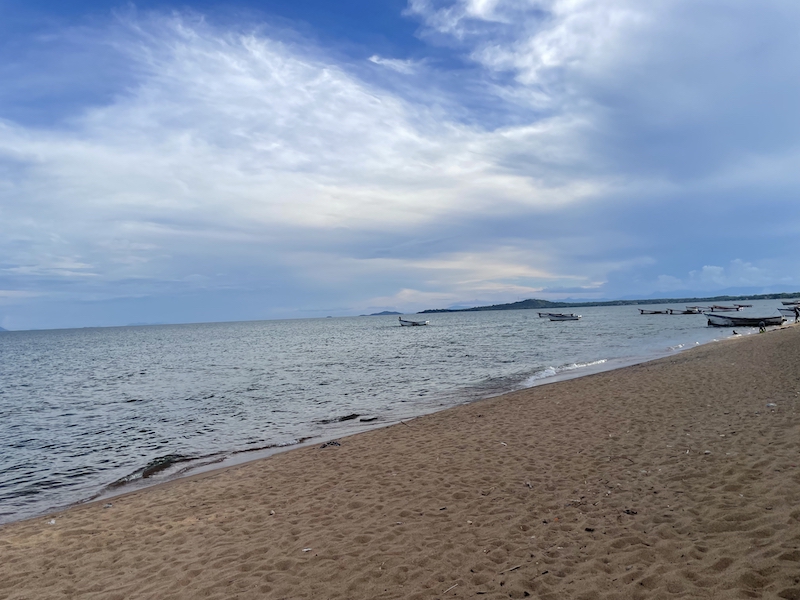During the holiday season, I traveled to Addis Ababa in Ethiopia, Dubai in UAE, and Cairo, Luxor, and Aswan in Egypt. It was an awakening experience visiting these big cities after staying almost half a year in Malawi, one of the poorest countries in the world1. At first, I was excited to relativize the situations I observed in Malawi compared to more developed environments in North Africa and the Middle East. However, when our plane was about to land at the Addis Ababa Bole International Airport, I soon realized the effort in making a comparison between Malawi and the rest was essentially meaningless; the numerous lights shining under the sky in the city were completely at the different level from the Malawian standard, and my intuition told me it is impossible to directly project the brightness onto Malawi's future.
 * The outside view near the destination was too different from the origin, and I impulsively took this photo from an airplane window.
* The outside view near the destination was too different from the origin, and I impulsively took this photo from an airplane window.
For the rest of my trip, there had been a lot of such surprises in the fundamental differences with Malawi. Buildings are crazy tall. Various cuisines are shockingly flavorful and answered to whatever needs I was craving. Decent quality and efficiency of services never disappointed me. No mosquito net on the beds. There are a lot more places where WiFi is available. Online/credit card payment? No problem. Oh, is there a ride-sharing app available? WOW. And the first cold draft beer on tap in 6 months—It was heavenly good. The basic lager was one of the best beers I've ever tasted in my life, seriously.
 * The first cold draft beer on tap in 6 months.
* The first cold draft beer on tap in 6 months.
Now, I can vividly understand the reverse culture shock Conor Grennan experienced when he returned to New York after volunteering in Nepal, according to Little Princes: One Man's Promise to Bring Home the Lost Children of Nepal. It should be noted that I do not intend to say one country is better than the other. Contrary, the journey reassured me that both are good in different ways and talking about one country relative to another would be a bit like comparing apples and oranges.
The realization surfaces an important idea for our development work: context-awareness. In case every country is fundamentally different, it would be critical to directly face the country's specific characteristics, accept the weaknesses, and optimize an approach for the particular context. Like Conor Grennan eventually returned to Nepal for an NPO called Next Generation Nepal, a particular problem in a particular situation needs a dedicated approach tailored to the context. Here in Malawi, what are the contexts we should be aware of?
Ideally, with the understanding of Malawi's digital infrastructure, Malawian's day-to-day life, and Malawian economy, we must design/implement a project through the lens of "end users" (Malawian local citizens). However, as we've seen in computer education in Malawi, Malawian contexts are rarely spoken, and many development projects are the basic copy-n-paste of what the Western nations call "best practices", which are hardly sustainable. This is the dilemma I've seen for the last 6 months working in the country, yet relativizing the country throughout the trip has made me confident that it is a key problem to dig deep into.
Recently, I got an opportunity to discuss these topics with Malawian developers at TechMalawi Discord community.
This Sunday we are welcoming @takuti on our Discord Server for a talk: TOWARDS THEH ETHICAL, HUMANE AND
— #TechMalawi 🇲🇼 (@techmalawihub) January 26, 2024
SUSTAINABLE USE OF INFORMATION TECHNOLOGY
It will be interesting. #TechMalawi pic.twitter.com/LAOEL2hYwz
The key perspectives I highlighted in my talk were three-fold:
- Since the power dynamics in the tech industry is skewed, we developers must intentionally rethink how to use the tech for what purposes.
- Ask WHY we build this particular software/tool. "Because it's cool/trending" won't be the reason.
- Importance of context-awareness and localization. We should optimize HOW to the field. Tech in Malawi must be different from tech in America, for example.
It was a highly insightful opportunity for me to connect with Malawians who know better about the local contexts. I appreciate the opportunity given by the community organizer and the audience who listened to, commented on, and asked questions about my talk. In particular, I enjoyed a conversation about the contrast between what's good for society vs. capitalistic money making.
This, in fact, is not a binary choice. There is indeed an urgency for Malawians to earn money to survive tomorrow and grow in the long run. But it doesn't mean you have to give up the ethical, humane, and sustainable aspects of the development. Rather, we can incorporate these perspectives into the processes bit by bit. For instance, you can still start your AI business for the sake of making money, but choose a problem wisely based on user studies, and deliver a quality product that addresses a user's pain point. It eventually contributes to a better market fit, good reputation, and rapid growth of your business. We can be context-aware while making the work profitable.
Such an idea going somewhere in the middle of capitalism (speed, efficiency, scalability) and goodness is about sustainable capitalism I'd like to pursue this year. The good news is that the opportunities and support systems to make it happen are already here in Malawi. With Malawi Vision 2063, there are a lot of financial, material, and human resource investments coming from governments and international organizations in both global and regional context. Therefore, it is now up to Malawians how deeply they can relate themselves to the surrounding environment as a personal matter. This is a big challenge though; there was an opinion about Malawian's "follower" attitude, saying Malawians (developers) tend to follow and imitate what other people/counties are doing, and they will never create a trend by themselves and take a lead on a development effort.
In the end, what I can do for the rest of the 6 months is to focus on what Malawi offers, without overly relativizing and generalizing the observations.
 * Although all the travel destinations were nice, I actually like Malawi more. Regardless of the reality, I wish a bright future for the country.
* Although all the travel destinations were nice, I actually like Malawi more. Regardless of the reality, I wish a bright future for the country.
1. According to one of the latest 2024 reports, Malawi is still ranked 10th poorest county in the world. ↩This article is part of the series: Digital Malawi: Developing Hope in the Information Age
Support
Gift a cup of coffeeShare
Categories
See also
- 2024-04-30
- I'm Not "China"—Connecting HERE and THERE in Systems
- 2023-09-08
- Definition, Role, and Current Status of Digital Literacy in Malawi #LiteracyDay
- 2023-08-23
- Starting Field Study on How Information Flows in Malawi
Last updated: 2024-01-31
Author: Takuya Kitazawa
I am an independent consultant, mentor, and advocate for sustainable technology development with a decade of experience in AI/ML products, data systems, and digital transformation. Based in Canada and originally from Japan, I have lived and worked globally, including part-time residence in Malawi, Africa. See CV for more information, or contact at [email protected].
NowDisclaimer
- Opinions are my own and do not represent the views of organizations I am/was belonging to.
- I am doing my best to ensure the accuracy and fair use of the information. However, there might be some errors, outdated information, or biased subjective statements because the main purpose of this blog is to jot down my personal thoughts as soon as possible before conducting an extensive investigation. Visitors understand the limitations and rely on any information at their own risk.
- That said, if there is any issue with the content, please contact me so I can take the necessary action.